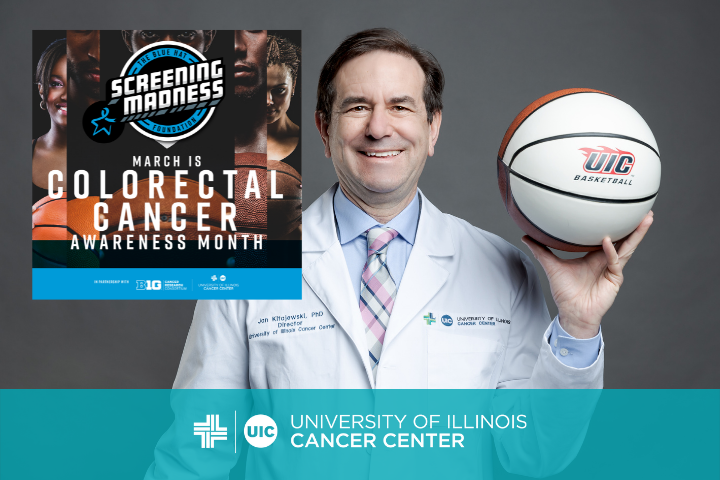
The second annual “Screening Madness” tips off on March 13.
The Big Ten Cancer Research Consortium is teaming with the Blue Hat Foundation to leverage the National Collegiate Athletic Association’s (NCAA) annual basketball tournament, “March Madness,” with a goal of raising awareness of colorectal cancer. The tournament coincides with Colorectal Cancer Awareness Month, and organizers hope the heightened awareness will nudge fans to get screened.
A dedicated webpage, bigtencrc.org/ScreeningMadness, contains a playbook to educate people about the importance of colorectal cancer screening. Visitors are urged to take the pledge to “get screened for colorectal cancer, or to encourage someone else age 45 or older to get screened.” When signing the pledge they can designate a Big Ten team to receive their pledge points. A scoreboard with all of the institutions that provide screenings will be updated daily.
In 2021, the University of Illinois Cancer Center finished runner-up to the Fred & Pamela Buffett Cancer Center at the University of Nebraska. Overall, 136 pledges were submitted during the social media campaign featuring Big Ten Cancer Center directors. The Big Ten CRC website also contains 15 important facts on colorectal cancer and links that direct individuals to each Big Ten institution that offers screenings. Individuals are also encouraged to post photographs on their social media sites wearing a piece of royal blue clothing, reflecting the official color of Colorectal Cancer Awareness Month. The photos should contain the hashtag #ShowYourBlue and #screeningmadness.
Colorectal cancer begins in the colon or the rectum, and nearly always develops from precancerous polyps, or abnormal growths. Screening tests can locate precancerous polyps so they can be removed before turning into cancer, and the tests can also find colorectal cancer early, when treatments are more successful.
Excluding skin cancer, colorectal cancer is the third most common cancer diagnosed in both men and women in the United States. This year, an estimated 151,030 adults in the U.S. will be diagnosed with colorectal cancer – 106,180 new cases of colon cancer (54,040 men and 52,140 women) and 44,850 new cases of rectal cancer (26,650 men and 18,200 women). The rate of people being diagnosed with colon or rectal cancer each year has dropped overall since the mid-1980s, mainly due to more people getting screened, and changing their lifestyle-risk factors, such as exercising more and eating a healthier diet, the American Cancer Society said.
The Blue Hat Foundation was created in 2015 by colorectal cancer survivor Candace Henley, who also serves as a co-chair of the Cancer Center’s Community Advisory Board (CAB). The Blue Hat Foundation focuses on bringing awareness, education and free colorectal cancer testing to those in minority and medically underserved communities.
Henley was uncertain how the event would be received in its inaugural debut last year, but she was excited about the results. This year she’s expecting bigger things. Not only does she have the backing of the Big Ten CRC and the Cancer Center, but Robert H. Lurie Comprehensive Cancer Center of Northwestern University, along with the Associated Student Government of Northwestern and the university’s athletic department, are joining the team.
“Having the support of students this year is great, because they want to do their part in saving lives,” Henley said. “Along with the groups, we’re also adding more information on early-age-onset colorectal cancer because research shows that by 2030 the disease will be the leading cause of cancer death in people between the ages of 20 and 49. We need to talk about it with our young people and make them aware.”
Throughout the years the NCAA has turned March Madness into a phenomenon, and Henley’s goal is to see that her program grows as well.
“My goal is simple,” she said. “I want to save lives by encouraging as many people as I can to get screened to avoid the 16 years of tragedy I experienced and a lifetime of chronic health issues.”
